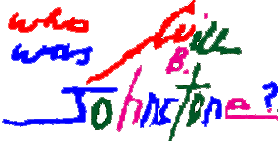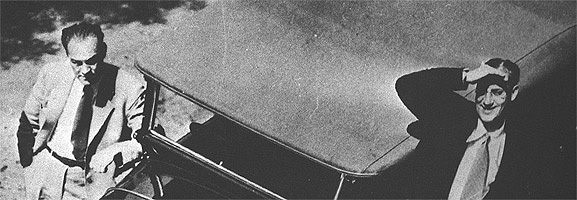
[Main Page] | [History] | [Vaudeville] | [Misc.] | [Films & Film Projects]
 | Mikael Uhlin's Marxology @ marx-brothers.org
[Main Page] | [History] | [Vaudeville] | [Misc.] | [Films & Film Projects] |


Will B. Johnstone and Groucho Marx in 1931
| I'll Say She Is,
the Marx Brothers' first show on Broadway, was the lucky combination of
them and the Johnstone Brothers. With the help of relatives of Will B.
Johnstone (most notably his son Will B. Johnstone Jr., his great
granddaughter Meg Farrell and Bruce Beckman, grandson of his second
wife Constance) I've tried to find out who Will B. Johnstone was.
He was born in 1883 in St. Louis, Missouri, and raised at the family
home in Evanston, Illinois. His father Thomas Taylor Johnstone was a
graduate of Rensselaer Polytechnic Institute and became one of the
leading civil engineers of the time. His mother Wilhelmina Saphira
Fritz Breuninger was the daughter of jeweler Wilhelm Gustave Breuninger
from Washington, D.C., the designer of the "globe and anchor" U.S.
Marine Corps device. Will's older brother Alexander was an accomplished
musician and a concert violinist who ended his life as a race-tout in
Florida, living in a trailer complete with a pipe organ. The youngest
brother Thomas "Tom" A. Johnstone (1889 - 1970) was also of musical
bent and worked as art editor for The World. Later he ran a very successful business, managing comic book artists illustrating advertising comic ads and books.
Will B. Johnstone was a great artist and athlete. He was the
catcher on the Evanston Township High School baseball team before being
admitted to Northwestern University. After a few days he withdrew to
accept a scholarship at the Chicago Art Institute and upon graduation
he became an artist with the Chicago Interocean. In those days
reporters did not have camera men but used artists to illustrate their
stories. Will was the first person to diagram football games showing
every play for each team (see The Will B. Johnstone Virtual Gallery). Will B. Johnstone, Jr. writes: "I'll
always remember the day he took me to see Red Grange's debut as a
professional football player. He ran 77 yards (his jersey number) for a
Chicago Bears touchdown against the New York Giants. How Dad loved
football!"
Will Junior also reveals that his father was an avid history buff; "He took me around to the many revolutionary battle fields in New York and New Jersey. He showed me the exact movements of the troops during each battle. The battle fields of Saratoga and Monmouth were made to live in my mind. He showed me pictures of Molly Pitcher's well and the wounded soldiers' blood on the pews in the Monmouth Church". Will fell in love with Helen Ross Beckham and when her family moved to New Jersey, Will followed. "I will never forget Dad's revenge on Grandpa Beckman who did not think he was good enough to marry his daughter, Helen", Will Junior says. "Grandpa
had brought a parrot back from a trip to South America and when he was
going to California next winter we had to baby-sit the parrot. Dad
waited until the family had turned in for the night then, using a
picture of Grandpa, prepared the parrot to welcome Grandpa on his
return. When Grandpa came into the door of his apartment the parrot was
in his cage by the front door and blurted out, "Hello you old
son-of-a-bitch"! Dad had his revenge."
Will's first job in New York City was with the Hearst Newspaper
doing illustrations, but he felt the Hearst management too controlling
on the subject matter of his work so he quit. He was then hired as a
political cartoonist at the New York paper The World (which later became The New York World-Telegram).
Will commuted from his home in East Orange, New Jersey, on the
Lackawanna Railroad to Hoboken and then took the ferry to lower
Manhattan walking through the Fulton Fish Market and pass the Woolworth
building to his office in The World, overlooking New York's
City Hall. After the market crashed in 1929, he said that he should be
getting combat pay because of the dangerous walk past the Woolworth
building where many market losers were leaping out of windows
committing suicide.
Before being replaced by Dick Dorgan, Will was the original artist on comic strip "You Know Me Al",
which ran 1922-25 and was based on author Ring Lardner's series of
letters from fictional baseball player Jack Keefe to his hometown pal
Al, chronologizing this bush-league player's rise to the majors. In
1979, Harcourt, Brace and Jovanovich reprinted the comic strip
adventures of Jack Keefe in a 165 pages paperbound book. Ring Lardner
was also one of the members of the Algonquin Hotel's famed Round Table,
including Harpo and led by Alexander Woollcott. Years later, Lardner's
son Ring Lardner Jr wrote the movie script of Richard Hooker's novel
"M*A*S*H".
While in New York, Will also started to write plays, often in
collaboration with his brothers. The three Johnstone Brothers were
involved in creating at least 10 musical shows between 1911 and 1925. Regarding Up in the
Clouds, Will Junior says that he still recalls one of the songs;
|
Will's interest in play-writing continued and his son writes:
After the success of I'll Say She Is, Will became one of the writers behind the Marx Brothers. "During
the long run many of the weekends we had the Marx Brothers with us in
East Orange, I blame them for my warped sense of humor", Will Junior writes. Meg passed on an anecdote from her grandmother regarding the acquaintance with the Marxes;
In 1926 Will was contracted to write a silent Marx film for First National but this was abandoned (see
A Film Fantasy).
In 1931 Will worked with Morrie Ryskind on an unused radio sketch for
the Marxes before Groucho suggested a collaboration with S.J. Perelman
for another proposed radio series. Perelman is quoted by Simon Louvish
in "Monkey Business - the Lives and Legends of the Marx Brothers";
Apart from co-writing the script for Monkey Business, Will also produced the cartoon for the pressbook (see The Will B. Johnstone Virtual Gallery).
According to Perelman, Will dashed off over fifty strip cartoons for
his paper on the train to Hollywood, as well as a sheaf of watercolours
of the remarkable passing landscapes.
For the production of Horse Feathers
in 1932, the writing team of Johnstone and Perelman were joined by
Arthur Sheekman, Bert Kalmar and Harry Ruby. The scene in the apartment
of the college widow (played by Thelma Todd) is clearly based on Napoleon's First Waterloo. Considering Will's great interest in football, it's also possible that he conceived the spectacular finale of
Horse Feathers.
Will Junior says that his father was a showman at heart;
After Will and Helen had divorced, he moved with his second wife
Constance to West Palm Beach in Florida, where he passed away in 1943.
Will Junior was in the South Pacific with the Marines at the time;
Meg's mother has most of the cartoons and his journals;
Meg also revealed how parts of the Napoleon scene has become a lovely family tradition;
|
Betsy
Opening: 11 December 1911
Produced by Byron Chandler
Music by Alexander Johnstone
Book by H. Kellett Chambers
Lyrics by W. B. Johnstone
Miss Princess
Opening: 23 December 1912
Produced by John Cort
Music by Alexander Johnstone
Written by Frank Mandel
Lyrics by Will B. Johnstone
The Red Canary
Opening: 13 April 1914
Produced by Mackay Production Co.
Music by Harold Orlob
Book by William Le Baron and Alexander Johnstone
Lyrics by Will B. Johnstone
Fiddlers Three
Opening: 3 September 1918, Cort Theatre
Total Performances: 87
Produced by John Cort
Music by Alexander Johnstone
Written by William Carey Duncan
Lyrics by William Carey Duncan
Take It From Me
Opening: 31 March 1919
Directed by Fred A. Bishop, Joe C. Smith and Joseph Gaites
Music by Will R. Anderson
Book by Will B. Johnstone
Lyrics by Will B. Johnstone
Up In The Clouds
Opening: 9 January 1922
Produced by Joseph M. Gaites
Libretto by Will B. Johnstone
Lyrics by Will B. Johnstone
Music by Tom Johnstone
Molly Darling
Opening: 1 September 1922, Liberty Theatre
Total Performances: 99
Produced by Moore and Megley
Music by Tom Johnstone
Book by Otto Harbach and William Carey Duncan
Lyrics by Phil Cook
Plain Jane
Opening: 12 May 1924, New Amsterdam Theatre
Total Performances: 40
Produced by Louis I. Isquith and Waller Moore
Music by Tom Johnstone
Book by McElbert Moore and Phil Cook
Lyrics by Phil Cook
I'll Say She Is!
(earlier names: "Love For Sale" and "Give Me A Thrill")
Opening: 19 May 1924
Produced by Joseph M. Gaites
Libretto by Will B. Johnstone
Lyrics by Will B. Johnstone
Music by Tom Johnstone
When You Smile
Opening: 5 October 1925, National Theatre
Total Performances: 49
Produced by James P. Beury
Book by Tom Johnstone and Jack Alicoate
Music by Tom Johnstone
Lyrics by Phil Cook